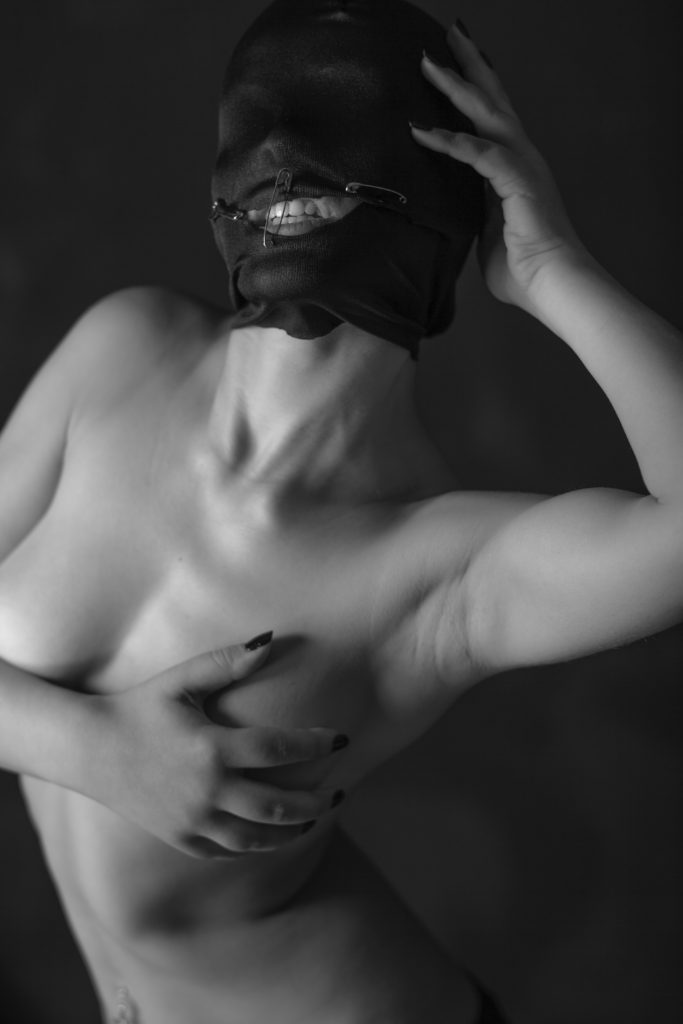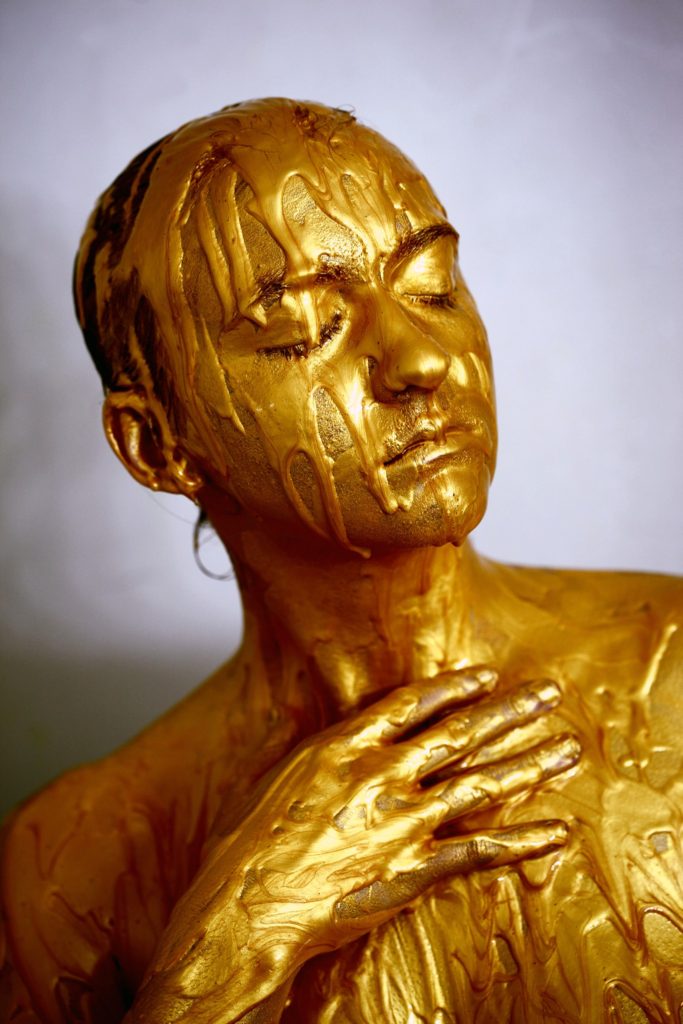I was seven years old when I realised that I didn’t look like the girls on T.V.
I vividly recall standing in front of a mirror in the changing rooms of a kids’ clothing store and staring at my reflection with disappointment.
I’d wanted a bikini. I’d seen them on T.V. To be fair I’d seen them on Baywatch. A pre-Dawson’s Creek Michelle Williams had starred as a love interest to Mitch’s son Hobie. She wore a cute bikini and jogged along the beach – as most people in Baywatch tend to do.
Seeing as I (and most girls my age at the time) had a huge crush on Hobie, I decided that I wanted to look just like Michelle. First thing’s first, I would get myself a bikini and then ta-da I would practically be her.
Body Image and the Bikini Belly
So off I went one Saturday with my Mum on a girlie shopping trip. I picked out the most Michelle-Williams-esque bikini I could find and then headed to the changing rooms. As I stood there looking in the mirror a strange realisation washed over me: I did not look like Michelle Williams. In fact, I didn’t look like any of the girls on T.V. Unlike theirs, my stomach was not flat and defined. Instead it was a soft, rounded pot belly. I also did not have a bronzed California tan. I had, what can only be described as The New Zealand Summer Tan. Meaning hardly any tan at all. My skin was pale all over except for a strip of freckles across my nose and a rosy red flush to my cheeks.
For the first time in my life I had made a direct comparison of myself against another person. It was a strange feeling of blatant self-directed judgement. Instead of seeing these differences as simply differences, I saw them as case of Good Vs Bad or Right Vs Wrong. And in this situation, it was my reflection that was wrong. It was my body that was bad.
It Starts Young
Frighteningly, a study carried out by the AAUW, found that self-esteem levels in girls begins to drop from the age of nine. The survey, which studied 3000 children, revealed that a large proportion of girls, who claimed to feel confident in themselves and their abilities at the age of nine, were less likely to do by the time they reached high school.
The study in question was conducted back in the 90s, when self-esteem was still a buzzword. Since then ‘self-love; and ‘personal-development’ have come along, with countless resources around to target adults who missed the focus back when it peaked. But what about children and teens? When these kids were surveyed their exposure to media was much more limited that it is today. Back in good old 91, we had T.V., the newspaper and the (very) occasional Billboard (this was Hamilton). Today, with the influx of digital media and social media, there are too many forms of media to count! It is everywhere.

Image Modification
The problem with media is that it’s ultimately a platform for marketing, and when you’re marketing things you want them to appear as perfect as possible. It’s not enough to sell clothes by using a beautiful model – whose body type is in the genetic 5% percent – you also have to retouch the images, so they look even more perfect. Sadly every single image we see online or in print (even in film!) has been modified to look even more flawless. And this is what us, and our children are exposed to for around eight hours a day – the estimated media exposure time for young people today. Over the course of a year, kids between the ages of 2 – 11 will see on average 25,600 ads.
Body Image and Self Esteem
Young girls are struggling with their self-esteem more and more. In a study conducted by the Dove Self Esteem Project it was found that 72% of girls felt a huge pressure to be beautiful but only 11% of girls felt comfortable calling themselves beautiful. Frighteningly 6 out of 10 girls questioned said that they are so self-conscious of how they look that it is holding them back from trying new things, sharing their opinion and even going to school.
It’s not surprising then that only 4% of adult women could describe themselves as beautiful. Perhaps that explains why, in a study shared in Naomi Wolf’s The Beauty Myth, 33,000 women admitted they would rather lose 5kg than achieve any other goal. Isn’t that sad? Think of all the things you could do instead: Learn a new language, play an instrument or write a book! But instead, the idea of looking “good” seems to pique our interest more than anything else.
When we are bombarded with unrealistic images all day long it is not hard to become influenced by them. It’s not only that the women in the images look thin and flawless, they also look happy, have a handsome man on their arm and appear to be where the party’s at. Subliminally be are being taught that ‘only thin beautiful girls have fun’. Which is exactly what the marketing companies want you to think. This constant barrage of brainwashing never ceases.
Impossible Goals
While it is highly unlikely that we will look like a girl on a magazine cover, we can only keep trying. We try so hard and then fail at this impossible goal. But the goal never leaves our head. In fact, this desire to look perfect, and the self-loathing that comes from failing to, is a downward spiral. We become so obsessed with how we look that it fills our minds, making it hard for us to focus on anything else. All of our other goals go out the window while we obsess over not being good enough.
But alas, when we feel like we are not good enough, we are less likely to succeed in other areas of our life. As the late and great Louise Hay once said “Every thought we think is creating our future”.
From as young as the age of seven I began to assess myself far more critically. Whereas in the past I’d been more concerned with dancing, painting and writing, after the episode with the bikini I became far more caught up in how I looked and I how I could improve how I looked. I hated my hair. I hated my skin. I hated my boobs (or my lack thereof). I even recall going to the gym with my mum to try and “lose weight”.
At 11 I stared reading Dolly magazines, which only further fuelled my obsession with how I looked. Instead of studying I was using a deep treatment conditioner to tame my frizzy hair. Instead of after school sports, I was exfoliating my rough skin. Instead of playing the drums I was bleaching my moustache and by the time I was 13, throwing my up food.

We are so Much More than How we Look
I spent so much time focusing on my flaws that I failed to learn the value of my strengths. The sad and interesting part is that our flaws never go away. Sure we may amend some of them but ultimately, unless we learn to accept ourselves, another flaw with rear up in its place, begging us to focus our energy on it. As women we must learn to ignore them. If we are going to live our lives to our true potential we must learn to love ourselves. If we don’t then we are not just letting ourselves down, we are letting all women down.
In the Beauty Myth Naomi Wolf writes: “A consequence of female self-love is that the woman grows convinced of social worth. Her love for her body will be unqualified, which is the basis of female identification. If a woman loves her own body, she doesn’t grudge what other women do with theirs; if she loves femaleness, she champions its rights.”
Changing your Thinking
When we refuse to play a part in the game of self-loathing and lack, we free ourselves up to allow room for love, joy, gratitude and abundance. Why not try it. For just one note down every time you give yourself a negative thought. It doesn’t matter if it’s about your appearance or your performance, simply note it down. You can write down the thought or you could put a penny in a jar every time you hear a nasty niggle pop into your mind. At the end of the day have a look and see how many cruel thoughts you have had about yourself. Warning: This part could surprise you.
The following day try something else. Every time you hear a negative thought, stop it in its tracks. Tell it to piss off – you can say it aloud if you want though you might get a few strange looks. Then, to change your vibration, jump up and down five times or take five deep breaths. Then finally, consciously replace that negative thought with a positive affirmation: I love and accept myself completely and utterly.
When we are constantly judging and giving ourselves shit, we are sending the message to the Universe that we are not good enough and therefore not worthy of receiving abundance. When we tell ourselves ‘I’ll be happy when I’ve lost 10 kilos’ or I’ll love myself when my skin is better’ we are telling the Universe we don’t want anything good in our lives until we’ve achieved that goal. But, not many goals are achieved out of self-loathing.

Subscribe to my mailing list here!

